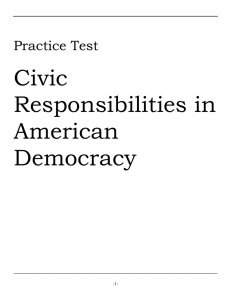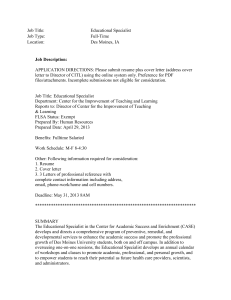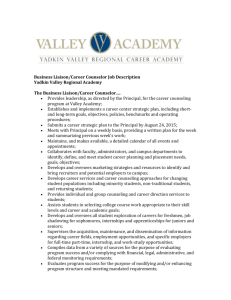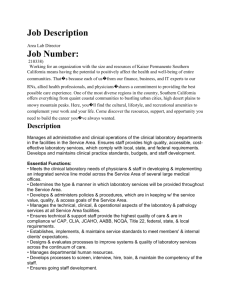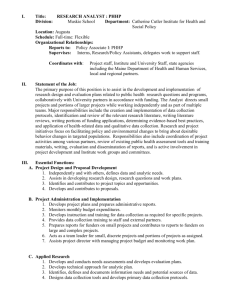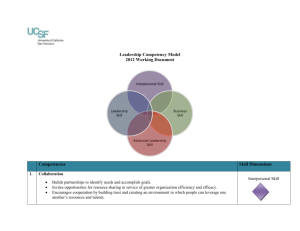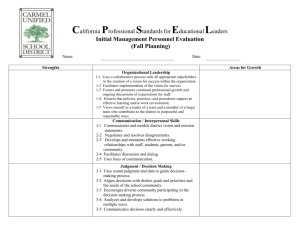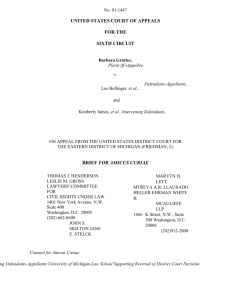Joy at Work
advertisement
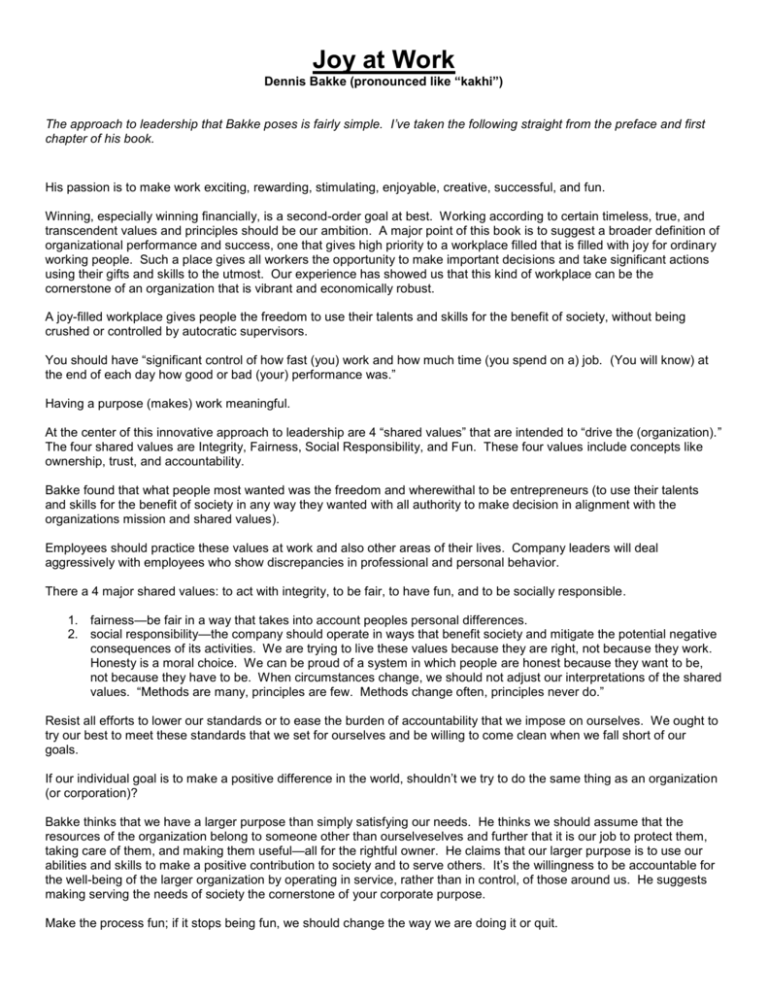
Joy at Work Dennis Bakke (pronounced like “kakhi”) The approach to leadership that Bakke poses is fairly simple. I’ve taken the following straight from the preface and first chapter of his book. His passion is to make work exciting, rewarding, stimulating, enjoyable, creative, successful, and fun. Winning, especially winning financially, is a second-order goal at best. Working according to certain timeless, true, and transcendent values and principles should be our ambition. A major point of this book is to suggest a broader definition of organizational performance and success, one that gives high priority to a workplace filled that is filled with joy for ordinary working people. Such a place gives all workers the opportunity to make important decisions and take significant actions using their gifts and skills to the utmost. Our experience has showed us that this kind of workplace can be the cornerstone of an organization that is vibrant and economically robust. A joy-filled workplace gives people the freedom to use their talents and skills for the benefit of society, without being crushed or controlled by autocratic supervisors. You should have “significant control of how fast (you) work and how much time (you spend on a) job. (You will know) at the end of each day how good or bad (your) performance was.” Having a purpose (makes) work meaningful. At the center of this innovative approach to leadership are 4 “shared values” that are intended to “drive the (organization).” The four shared values are Integrity, Fairness, Social Responsibility, and Fun. These four values include concepts like ownership, trust, and accountability. Bakke found that what people most wanted was the freedom and wherewithal to be entrepreneurs (to use their talents and skills for the benefit of society in any way they wanted with all authority to make decision in alignment with the organizations mission and shared values). Employees should practice these values at work and also other areas of their lives. Company leaders will deal aggressively with employees who show discrepancies in professional and personal behavior. There a 4 major shared values: to act with integrity, to be fair, to have fun, and to be socially responsible. 1. fairness—be fair in a way that takes into account peoples personal differences. 2. social responsibility—the company should operate in ways that benefit society and mitigate the potential negative consequences of its activities. We are trying to live these values because they are right, not because they work. Honesty is a moral choice. We can be proud of a system in which people are honest because they want to be, not because they have to be. When circumstances change, we should not adjust our interpretations of the shared values. “Methods are many, principles are few. Methods change often, principles never do.” Resist all efforts to lower our standards or to ease the burden of accountability that we impose on ourselves. We ought to try our best to meet these standards that we set for ourselves and be willing to come clean when we fall short of our goals. If our individual goal is to make a positive difference in the world, shouldn’t we try to do the same thing as an organization (or corporation)? Bakke thinks that we have a larger purpose than simply satisfying our needs. He thinks we should assume that the resources of the organization belong to someone other than ourselveselves and further that it is our job to protect them, taking care of them, and making them useful—all for the rightful owner. He claims that our larger purpose is to use our abilities and skills to make a positive contribution to society and to serve others. It’s the willingness to be accountable for the well-being of the larger organization by operating in service, rather than in control, of those around us. He suggests making serving the needs of society the cornerstone of your corporate purpose. Make the process fun; if it stops being fun, we should change the way we are doing it or quit. We should attempt to live according to a set of unchanging shared ethical principles, because it is the right way to live. Our efforts to do so need not to be sweetened with additional benefits, such as better financial results, more successful recruiting, happier employees, or even improved productivity. These goals are worth pursuing irrespective of the bottom line. It is not only whether I live a certain way that is important. It is whether the way I attempt to live is based on true and moral principles. Bakke believes that bosses usually have all the fun because they have the control and the ability to effect the outcome of the company. The following characteristics are the most important of a leader: 1.Humility-it’s when we believe we are not any better than any of the people we lead 2.Love-it’s when you love the people you serve so much that you are willing to sacrifice your own joy so that other people can soar not because they are going to make more money, but because you love them. He thinks that the less layers of heirarchy, the better. We want to create an environment in which people want to keep control. Maximizing return is not the purpose of a business. The purpose of a business should be to create joy in the workplace in an economically sustainable manner with humility, passion and love. His approach to leadership requires that all members get feedback from each other on major decisions. They are not obligated to obide to change the outcome of a decision because of another person, but they are required to ask and listen. Beyond that, they have full authority and control over the matter. I would like to make a durastic change to the structure of the organization. I propose that we eliminate titles and positions completely and instead create “The Project Sunshine Round Table.” In order to be a part of the round table, everyone must: -live by the four shared values (to act with integrity, be fair, have fun, and be socially responsible) -use their individual, God-given abilities to make a positive contribution to society -be personally accountable for the well-being of the larger organization -inform the round table of what they’re doing and where they’re headed at each meeting -ask for and listen to input and feedback from the group on a regular basis Everyone should be able to do whatever they have interest in doing as long as it doesn’t stray from the above guidelines I’ve compiled from Dennis Bakke’s book. I expect peoples’ interests to change frequentely and this approach allows the flexibility to let you run with it. If a need is not met by any members of the round table, the organization and, in a way, the society will suffer until a volunteer or volunteers accept responsibility for it and complete it. I think communication and flexibility are keys to this approach. For now, think about what you’re interested in doing and go for it! Ask if other members have similar interests and you can work together if you like. See you Monday! J I want people to continually redefine their roles in the organization depending on what their interests are. It might be helpful for you to create a title that defines your interests at any given moment in time. If you give yourself a title, the title is subject to change at any time your interests change. It’s important that we all have an updated list of peoples’ selfdefined titles and/or roles in the organization that are based on what interests them and also follow the guidelines of this approach to leadership. Leaders are not defined by titles. Leaders are leaders with or without titles. As an example, I’m interested in making being on the Project Sunshine eboard exciting, educational, rewarding, stimulating, creative and fun for everyone while at the same time, also making Project Sunshine successful. I plan to do this by: being a leader that: o develops leaders o keeps team members happy o o o o o o o o o o o o o o o o o o o o o o o o o o o o o o cares about each eboard member, general member, affiliate, and child is a model leader makes those around me more successful loves people more than procedures offers creative ideas for change and improvement plans and anticipates problems inspires others to do better work creates a climate for change solves problems with people, not for them addresses the 4 common reasons why people don’t perform to their abilities there are obstacles beyond their control they don’t know what they’re supposed to do how to do it why they should do it develops better people to work encourages learning from the past encourages feedback on all fronts encourages open, honest communication looks for opportunities to build people sees the big picture doesn’t waste their own time or anyone else’s creates momentum sees and capitalizes on individual interests and talent develops a sense of responsibility in team members creates an atmosphere for continuous improvement gives a minimal amount of orders asks a lot of open-ended questions to better understand team members makes it fun gets members to decide to be leaders and take leadership roles develops team member trust through consistent integrity develops emotional intelligence among others and oneself develops confidence in team members develops leaders that will lead better than me develops leaders that do the same My current title: Leader?
